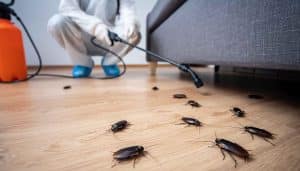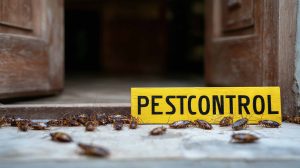So, you’ve been planning on renting your home but have recently noticed a few pesky pests crawling around like they already own your property? Whether it’s cockroaches, rodents, or ants, these pests can really be unsettling and frustrating.
Hence, the best and only solution to pest problems is to reach out to a service that offers pest control. But if you’re renting, the common dilemmas you can face are: who is responsible for pest control?
So, read the blog till the end to find out more!
Your Comfort Starts Here – Schedule a Pest Checkup Today!
Are Landlords Responsible For Pest Control?
In short, yes! If you are a landlord and the property that you have leased out is facing pest infestation problems, you are responsible for ensuring that the problem is addressed promptly.
Regardless of the state, housing laws across the US require landlords to make sure the property is pest-free. Many states have a deadline mentioned (usually 3-7 days) when the landlord is supposed to deal with both hazardous and non-hazardous pest issues.
In any case, failing to act within these windows may result in legal or financial consequences. For instance, if you live in areas like Roseville, you must respond within the stipulated timeline – hence, hiring a pest control immediately after the pests have been detected ensures compliance.
What Should You Do When Your Tenants Report Pests?
The first and most important step is to reach out to professionals for pest inspection. However, there are also a few crucial steps that you need to follow in such cases, such as –
1. Revisit Your Lease Contract
All contracts between landlords and tenants have a basic clause regarding what to do during a pest infestation. However, this can vary based on your state. So, once your tenant reports a pest problem, revisit the contract to ensure that both sides stick to the clauses.
2. Take Immediate Action
Take immediate action to address the infestation once your tenant reports it. Delays in action can worsen the problem and lead to tenant safety hazards and dissatisfaction. Prompt action prevents the spread of infestations.
3. Ensure The Safety Of Your Property
As the property owner, setting up regular or seasonal pest inspections will be beneficial for you in the long run. Not only will that help you keep your property protected, but it will also ensure that the market value of your property does not fall.
4. Maintain Documentation
You should maintain documents such as the cause of the infestation and the frequency of the infestation. This can help establish if your tenants are up to some foul play. Keeping everything documented with proper photographs and reports may also lead to your tenants paying for the infestation – if they are responsible for it in the first place.
5. Disclosing Existing Infestation Before Signing The Lease
ALWAYS maintain transparency and inform the new tenants about the pest issues before signing the lease. It is both a good practice and a legal requirement. If you’re upfront, it allows you to build trust and also helps the tenants to make an informed decision.
What Preventive Measures Must You (as a landlord) Take?
Pests can cause a nuisance in one’s life and also make your property less attractive. So, here are a few preventive measures you can take to ensure your property stays pest-free –
- Inspection And Maintenance
It is important to conduct regular pest inspections in and around your building to ensure these pesky creatures are not hiding anywhere. This helps ensure your property is well-maintained and that all entry points for pests, such as cracks or gaps in windows, walls, or doors, are sealed before they become a problem.Also, consider addressing small leak issues, as they attract pests. Additionally, remove any potential attractants, such as food debris. - Pre-Tenancy Pest Control Treatment
Before you put your property on lease, consider hiring a professional service to treat your space. This includes – setting up bait traps and sealing pest-prone areas.This proactive approach helps prevent future pest control issues from recurring. Also, it ensures that the next tenant feels welcomed. Moreover, pest control helps minimize the risk of complaints and ensures your property maintains its positive reputation. - Taking Care Of Structural Issues That Attract Pests
Fix all the broken windows, screens, and cracked walls, and add missing weather strips. These can block the entry of the pests, as even a tiny crevice can serve as a welcome mat for rodents and insects.Ensuring that these repairs are done and all other structural issues are taken care of reduces the risk of infestation and keeps the tenant happy. - Maintain Proper Waste Management And Landscaping
If you have poorly managed bins and trash cans, in addition to overgrown vegetation, they can quickly become breeding grounds for pests.Always keep the trash stored in a sealed container and dispose of it regularly. Trim shrubs, remove dead plants, and clean gutters to discourage nesting. If you keep your outside area clean and tidy, it not only deters pests but also enhances the beauty of your space.
No More Unwanted Guests – Schedule Your Pest Control Now!
When Should Tenants Pay For Pest Infestation?
The responsibility for pest control can shift to the tenants if the landlord can prove that the pest issues have occurred due to their actions. The factors could include –
- Negligence- If your tenants have not been taking care of the property as mentioned in the lease contract, they can be held responsible for the infestation.
- Lack Of Cleanliness- Failing to maintain basic hygiene or cleanliness within the property can be another cause of pest infestation. In such cases, proper documentation can be helpful.
- Improper Food Storage – Leaving half-eaten food lying around uncovered or not disposing of organic waste can attract different types of pests, like rodents.
- Delay in Reporting Leaks or Repairs- If your tenants fail to report problems with the property that result in pest infestation, they are liable for covering the costs.
Shared Pest Control Responsibilities And Preventive Measures
- Communication Between Tenants And Landlords Ask your tenant to notify you regarding any signs of pest activity if they notice any. Once they do, ensure a prompt response with the appropriate action. Also, keep a record of any pest-related complaints or treatments.
- Collaborative Efforts To Prevent Infestations You and your tenant must work together to eliminate the pests. You can take care of property maintenance and schedule pest control treatments as needed. At the same time, your tenants should keep their spaces clean and tidy.
- Regular Inspections By Both Parties Conduct regular inspections to identify pest issues early. You should inspect areas like basements, attics, and exteriors, while tenants can monitor and ensure their living space is pest-free.
Takeaway
It is quite important to keep yourself proactive as a landlord, especially when it comes to pest control. It is a part of your legal and ethical responsibility to provide tenants with a safe, livable space.
Hence, you must always conduct an inspection and get rid of the pests before leasing your property to other tenants. It will uphold your property’s value and reputation.
Read More About:
Is Your Property Facing Pest Infestation? With Finley Pest Control, You Are In Safe Hands.
At Finley Pest Control, we offer a comprehensive pest solution that ensures there are no nuisance-creating creatures left in your building. Based on both the scale of the infestation and the damage to furniture caused, our prices start at just $40, making us the best and most affordable service for pest control in Roseville.
Our transparent and reliable process with a customer-first policy ensures that your home is always at its prime. We are committed to your absolute satisfaction. Call us today to get a quote!








